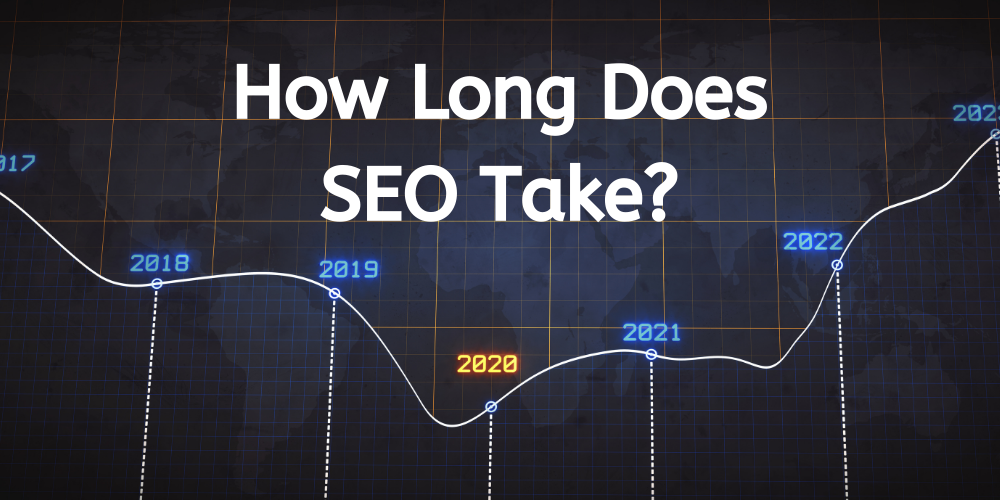Ever wondered how long it takes for search engine optimisation (SEO) to pay off? It’s a common question, like waiting for a cake to bake or paint to dry. Well, you’re in the right place! In this article, we’ll delve into the timeline of SEO success and explore the factors that influence the time it takes to see results. So, buckle up and let’s get started!
Table of Contents
- The Great SEO Race
- Slow and Steady: Typical SEO Timelines
- Factors Affecting the SEO Timeline
- Preparing for the Marathon: Building Your SEO Strategy
- Pit Stops: Monitoring Progress & Adjusting Course
- Crossing the Finish Line: What to Expect When SEO Pays Off
- Don’t Rest on Your Laurels: Maintaining SEO Success
- Conclusion
1. The Great SEO Race
SEO is like a long-distance race, where there are no shortcuts, and patience is key. While many people want quick results, the reality is that SEO takes time to show its full potential. As we explore this topic, keep in mind that SEO is not a sprint; it’s a marathon!
2. Slow and Steady: Typical SEO Timelines
So, let’s cut to the chase: how long does SEO take to pay off? The truth is, there’s no one-size-fits-all answer. Generally speaking, you can expect to see some results within three to six months. However, this timeline can vary depending on factors like competition, website age, content quality, and backlinks. Keep reading as we unpack these factors in more detail!
3. Factors Affecting the SEO Timeline
As we mentioned earlier, several factors can influence the time it takes for your SEO efforts to pay off. Think of these factors as hurdles in a race – some may slow you down, while others might give you a boost. Let’s take a closer look at these factors to understand better how they can impact your SEO timeline.
3.1. Competition
Just like in any race, the competition plays a significant role in determining how long it takes for SEO to pay off. The more competitive your industry, the more challenging it will be to rank highly in search results. If you’re in a crowded field, you might find that it takes longer for your SEO efforts to bear fruit, as you’ll need to put in more work to outpace your rivals. On the other hand, if there’s less competition, you could see results more quickly.
3.2. Website Age
Age matters in the world of SEO – and we’re not talking about fine wines here! The age of your website can impact how long it takes for your SEO efforts to pay off. Newer websites typically take longer to rank, as search engines like Google tend to be more cautious with fresh sites. It’s like being the new kid on the block – it takes time to build trust and credibility. On the flip side, older websites with a solid track record can enjoy quicker results, as search engines are more likely to trust them.
3.3. Content Quality
High-quality content is the bread and butter of any successful SEO strategy. It’s like the fuel that powers your race car – without it, you won’t go far. The better your content, the more likely it is that search engines will rank your website highly, and the quicker you’ll see results. So, if you want to speed up your SEO timeline, focus on creating top-notch content that is informative, engaging, and valuable to your audience.
3.4. Backlinks
Backlinks are like gold stars in the world of SEO – the more you have, the better your chances of success. High-quality backlinks from reputable websites signal to search engines that your site is trustworthy and worth ranking highly. However, building a robust backlink profile takes time and effort, so don’t expect overnight results. Keep in mind that quality matters more than quantity here, so focus on securing top-notch backlinks rather than amassing a vast collection of low-quality ones.
4. Preparing for the Marathon: Building Your SEO Strategy
Now that you have an idea of how long SEO takes to pay off and the factors that can impact your timeline, it’s time to start preparing for the race ahead. Building a robust SEO strategy is crucial to ensuring success, and it’s essential to tailor your approach to your specific goals and circumstances. Here are some steps to help you get started:
- Set clear objectives: Before you start, make sure you have a clear idea of what you want to achieve with your SEO efforts. Are you looking to drive more traffic, boost sales, or increase brand awareness? Having a clear goal will help you focus your efforts and measure your progress.
- Conduct keyword research: You need to know what your target audience is searching for, right? So, roll up your sleeves and dive into some good ol’ keyword research. This will help you identify the terms and phrases your audience uses when looking for products or services like yours. It’s like having a treasure map, guiding you to the keywords that will lead to SEO success!
- Create top-notch content: As we mentioned earlier, high-quality content is the lifeblood of SEO. So, put your creative hat on and start crafting content that’s informative, engaging, and downright awesome. Remember, you want your content to stand out from the crowd, so don’t be afraid to think outside the box!
- Optimise your website: No one likes a slow, clunky website, especially not search engines! Make sure your site is easy to navigate, loads quickly, and is mobile-friendly. It’s like giving your race car a tune-up – with a well-optimised website, you’ll be ready to zoom up those search rankings!
- Build high-quality backlinks: Remember those gold stars we talked about earlier? It’s time to start collecting them! Reach out to reputable websites within your industry and look for opportunities to secure backlinks. Guest posting, collaborating on projects, and sharing your expertise are all great ways to build your backlink profile.
5. Pit Stops: Monitoring Progress & Adjusting Course
Just like in a race, you’ll need to make pit stops along your SEO journey to check your progress and make any necessary adjustments. Regularly monitoring your website’s performance will help you identify areas that need improvement and ensure you’re on track to reach your goals. Some key metrics to keep an eye on include organic search traffic, keyword rankings, and conversion rates. So, don’t forget to schedule those pit stops – they’re crucial for staying in the race!
6. Crossing the Finish Line: What to Expect When SEO Pays Off
So, you’ve put in the hard work, and your SEO efforts are finally paying off. High five! But what can you expect when you cross that finish line? Well, once your SEO starts to work its magic, you’ll likely see an increase in organic search traffic, higher search rankings, and improved conversion rates. This can translate to more leads, sales, and revenue for your business – and who doesn’t want that? Remember, though, that SEO is an ongoing process, so don’t rest on your laurels just yet!
7. Don’t Rest on Your Laurels: Maintaining SEO Success
Congratulations, you’ve made it to the top of the search rankings! But don’t pop the champagne just yet – maintaining your SEO success is just as important as achieving it. Search engines are continually updating their algorithms, and your competitors are always looking for ways to outrank you. So, keep up with the latest SEO trends, regularly update your content, and continue to build high-quality backlinks. Staying ahead of the game is essential for long-term SEO success!
8. Conclusion
So, there you have it – the lowdown on how long it takes for SEO to pay off and the factors that can impact your timeline. Remember, SEO is a marathon, not a sprint, and patience is key. With hard work, dedication, and a bit of perseverance, you’ll be well on your way to crossing that finish line and reaping the rewards of your SEO efforts.
If you’re feeling a bit overwhelmed by the SEO race, don’t worry – we’ve got your back! At Kinsale SEO, we’re experts in helping businesses like yours climb the search rankings and achieve online success. Our team of SEO wizards will work with you to develop a bespoke strategy that suits your needs and goals. So, why not get in touch and let us help you win the SEO race? Ready, set, go!
Frequently Asked Questions
- Q: Is it possible to speed up the SEO process? A: While there’s no magic wand to speed up SEO, focusing on high-quality content, optimising your website, and building strong backlinks can help you see results more quickly. Remember, though, that patience is key – SEO success won’t happen overnight!
- Q: Can I do SEO on my own, or should I hire a professional? A: While it’s possible to handle SEO on your own, it can be challenging and time-consuming, especially if you’re new to the game. Hiring an SEO professional can help you navigate the complexities of SEO and ensure that you’re on the right track to success.
- Q: How do I know if my SEO efforts are working? A: Regularly monitoring key metrics like organic search traffic, keyword rankings, and conversion rates can help you gauge the success of your SEO efforts. Don’t forget to schedule those pit stops to check your progress and make any necessary adjustments!
- Q: How often should I update my SEO strategy? A: SEO is an ever-evolving field, so it’s essential to stay up-to-date with the latest trends and best practices. Review your SEO strategy at least once a year, and make adjustments as needed to ensure you’re on track to achieve your goals.
- Q: Are there any SEO tactics I should avoid? A: Definitely! Some SEO tactics, known as “black hat” techniques, can harm your search rankings and even lead to penalties from search engines. Examples of black hat tactics include keyword stuffing, cloaking, and buying low-quality backlinks. Stick to ethical “white hat” SEO techniques for long-term success.
- Q: How important is mobile-friendliness for SEO? A: Extremely important! With more and more people using mobile devices to access the internet, search engines like Google have started prioritising mobile-friendly websites in their search results. Make sure your site is optimised for mobile users to improve your search rankings and user experience.

